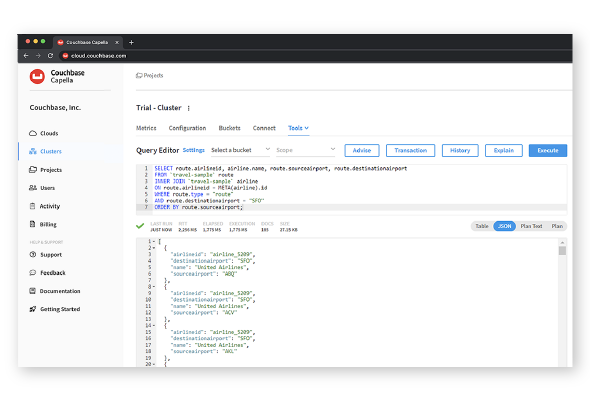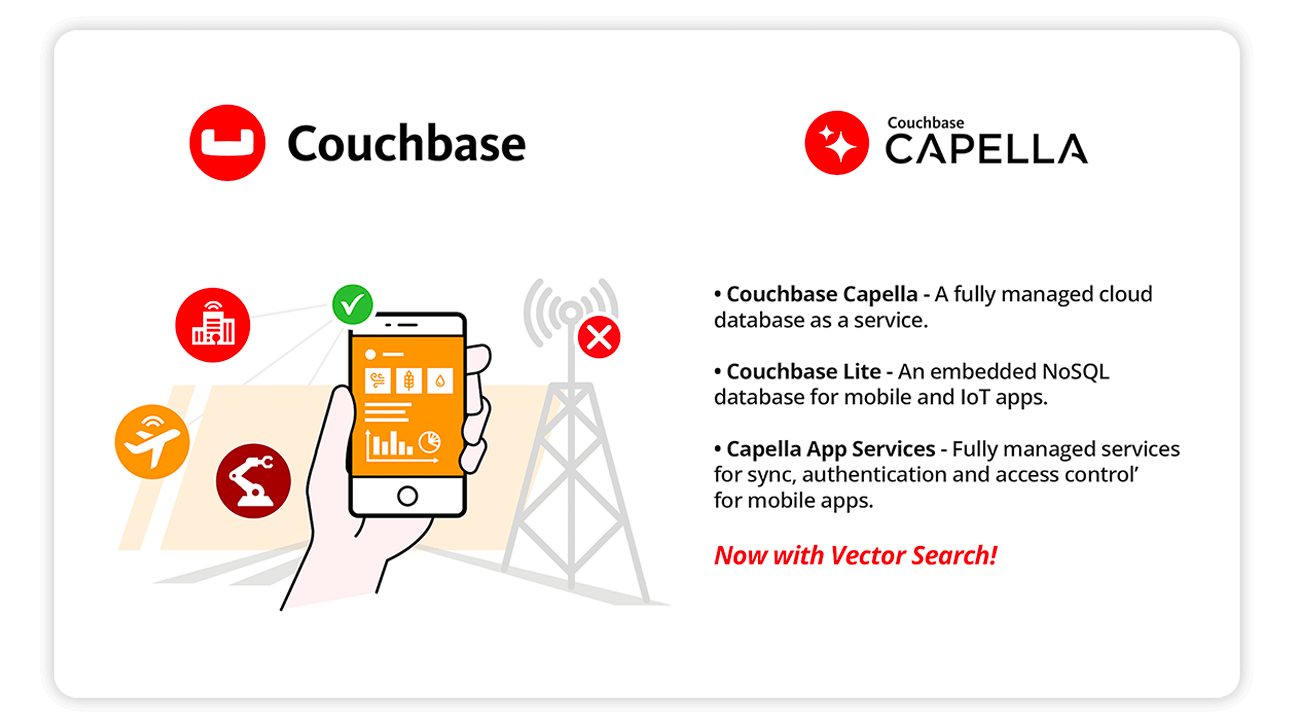Announcing Couchbase Server 7.1
Couchbase Server 7.1 introduces significant operational efficiencies that make Couchbase one of the most high-performance, usable, scalable, and economical databases ever. Improvements include better storage efficiency, tighter coupling to traditional RDBMS norms, and stronger operational analytics and insights with native Tableau integration.
Couchbase Server 7.1 is setting new standards in distributed database performance and driving predictably low TCO for all users and customers.
Key new features
High data-density storage engine, Couchbase Magma
Couchbase introduces Magma, a production-ready, high-density data storage engine inside Couchbase Server. Users can choose between the original Couchstore or the new high-density storage engine. High-density storage is the long-term preferred storage engine for the key-value engine. High-density storage has both compute and storage separation advantages, performance processing is up to 4x faster while utilizing up to 10x less memory, and storage capacity holds 3x larger data sets per node (from 3TB to 10TB per cluster node). These advantages result in smaller, more-affordable clusters that hold and process more data with higher processing throughput power.
How it Works Magma combines the performance of log-structured merge trees (LSMs) with the compaction, reorganizability, and immutability of sorted string tables (SSTables) to provide high performance in a well-organized, low-latency engine that suits write-heavy, low-latency point lookup workloads. This design minimizes disk space increases called “storage amplification” and reduces the accompanying complexity that occurs when documents are heavily mutated without being reorganized.
Dramatic Performance and TCO benefits
- With high-density storage, data capacity per node is extended from 3TB to 10TBs
- Performance tests exhibit 4x higher throughput (operations per second) and improvements to both write and read speeds
- High-density storage is also designed to support and scale with high-end SSDs such as non-volatile memory express (NVMe) SSDs
- Hardware specifications lower the per-node memory-to-data ratio from 10% to 1%. This allows customers to scale up to 10x more using their existing infrastructure, or to reduce by up to a factor of 10 the number of cluster nodes they need to handle large volumes of data.
Customers have the potential to see impressive savings for Couchbase Community and Enterprise Edition deployments.
Operational Analytics Advancements
Visualization of JSON data via Tableau Couchbase enables customers to use the leading business intelligence tool, Tableau, to visualize their JSON data. Our native driver transforms active Couchbase data into Tableau-ready relational structures – this includes interpolating data types and foreign key relationships from JSON structures. Tableau users can now construct ad hoc reports, dashboards, and interactive visualizations using their JSON data. The Tableau connector is available in SDK downloads.
New cloud data sources The Couchbase Analytics Service can now directly access data file targets from Google Cloud Storage and Azure Data Lake.
Better fault tolerance High availability is enabled for analytic cluster nodes, providing reliable, fault tolerant, real-time data access and live recovery after node failure.
ARM v8 Processor Support
ARM processors like Apple’s M1 and AWS Graviton offer high performance and consume less electricity, thereby lowering operational costs. This alone makes Couchbase Server’s support for ARM broadly appealing.
Developers can now build their applications in Linux containers on new Apple hardware and confidently deploy those applications to ARM-based cloud instances for the best performance at the lowest cost.
In internal tests with an update-heavy workload, Couchbase Server 7.1 exhibited nearly 10% higher throughput, 65% lower latency, and 25% lower costs when running on ARM-based instances.
Index Performance Array Indexes are designed to accelerate searches through arrays. Array Indexes also support the creation of composite indexes on array fields. These functionalities improve performance for queries with multi-array element predicates.
Global Secondary Indexes (GSIs) also use less memory and require fewer nodes for each index, thereby reducing infrastructure configuration requirements and costs.
Familiar DBMS Functionality
User Defined Functions with JavaScript Developers can extend existing query functionality with JavaScript-based user-defined functions (UDFs).These UDFs isolate specific functionality from the application and make the functionality more modular, accessible, and performant.
Couchbase UDFs allow developers to use the popular JavaScript language to construct custom operations and extend functionality that is not available with their current query functions. This feature offers all the capabilities developers need to migrate their RDBMS-stored procedures and functions into Couchbase.
Developers can directly manipulate Couchbase data using all existing SQL++ capabilities in order to provide transaction control and to access SQL++ functions and other UDFs. This feature allows applications to isolate complex business logic, and it improves application performance with the Couchbase server-side framework.
UDFs can be chained together and can be recursive. A developer preview of UDFs in the Analytic Service also supports Python.
System Event Log as JSON Data System event log, now available as JSON data, includes both event ID and timestamps. Event logs are automatically replicated across nodes. Currently, 10 thousand events are available to REST or streaming APIs.
Backup Service improvements
- The Backup Service supports backups to GCP (Azure backups are also introduced as “developer preview” functionality).
- Backup Service supports the “resume” option for restore commands
-
Backup manager introduces AES256 encryption of backups in the “developer preview”
Checkpoints in Cross Data Center Replication (XDCR) Incremental checkpoints for XDCR make replication more reliable, easier to manage, and more resilient when cluster topology and data locations change.
-
High Availability Automatic failover of multiple nodes during concurrent failures improves reliability for situations where cloud zones may be affected by an outage
-
Index Service and Analytics Service both support auto failover, and applications will suffer no downtime due to failures of these services
-
HA is supported for “unequal server groups” when server group clusters do not contain the same number of nodes and therefore need special consideration for how failovers are managed
Cloud-ready Security
Multiple Certificate Authorities Supports multiple certificate authority chains within the public key infrastructure (PKI). This allows separation of certificate hierarchies between application communication to its cluster network and authorized client authentication certificates. It also allows certificate authority rotation with zero downtime.
Encrypted TLS Private Keys & Key Management System integrations TLS private keys themselves are encrypted when stored and decrypted using a passphrase provided from secrets management, REST call, or customer script when used in memory. This capability also introduces a new TLS private key management system. This system is passphrase-based, but offers a variety of interfaces to provide the passphrase to the key management system. These interfaces can include secret management systems such as CyberArk and HashiCorp Vault, cloud provider vaults, and infrastructure key stores and hardware-managed solutions such as Trusted Platform Module (TPM) and Hardware Security Module (HSM).
Expanded Certificate formats Couchbase extends support beyond Public Key Cryptography Standard #1 (PKCS#1) to PKCS#8, which supports encrypted and unencrypted private keys. It also extends beta support for PKCS#12, which supports the Personal Information Exchange Syntax Standard, which are containers for multiple certificates.
Cluster-wide support for TLS v1.3 TLS v1.3 is supported for all cluster components resulting in more secure ciphers and faster encryption and decryption speeds.
Role-based Access Controls
5 RBAC roles for Server to Sync Gateway
There are five new role-based access controls for handling operations between Couchbase Server clusters and Sync Gateway. These roles include architect, application, application read only, replicator, and DevOps. These roles give customers fine-grained control over data flow and synchronization between Couchbase Lite-powered applications.
RBAC for Eventing Services
Role-based access controls created for Eventing Services provide better control over data access and manipulation.
Related resources
 Blogs
Blogs
- What’s New in Couchbase Server 7.1
- Announcing Couchbase Server 7.0
- Migrate to Scopes & Collections
- Compare SQL and SQL++
- 5 Steps to Better Database Performance
- Indexing Service Optimizations With Couchbase Collections
- Cost-Based Optimization With Couchbase JSON database
- Simplifying Query & Index With Collections
- Introducing RBAC Security for Collections
- N1QL User-Defined Functions
 Docs and Tutorials
Docs and Tutorials
- Docs: What’s New in Couchbase Server?
- Docs: Couchbase Server Release Notes
- Docs: Scopes and Collections
- Docs: Transactions
- Tutorial: Quickstart in Couchbase With Java and Spring Boot
- Tutorial: Couchbase Transactions With Java SDK
- Tutorial: Quickstart in Couchbase With Node.js and Express
- Tutorial: Quickstart in Couchbase With C# and ASP.NET
- Tutorial: Quickstart in Couchbase With Python and Flask
 Webpages and Webinars
Webpages and Webinars
- Webinar: How to Boost the Intelligence of Your Operational Applications With a Modern Database (With Forrester Research)
- Product Page: Couchbase Server
- Compare Couchbase Community Edition vs. Enterprise Edition
- Transactions With Couchbase
- Couchbase Analytics Service
- Develop With Couchbase SDKs
- Big Data and BI Connectors
Ready to create amazing customer experiences?
The easiest and fastest way to begin with Couchbase

